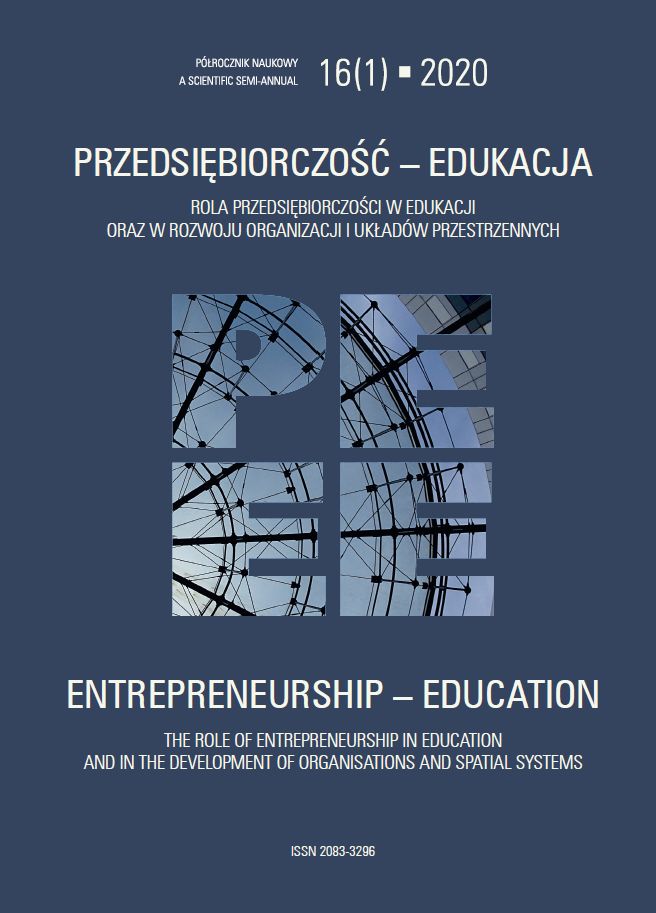National Brand and its Implications for the Study of Ukrainian Entrepreneurship of Generation Z in Light of Students Survey Research
DOI:
https://doi.org/10.24917/20833296.161.16Keywords:
entrepreneurship, national brand, students, surveys, UkraineAbstract
The national brand evokes associations and feelings that affect public opinion, social behaviour, including intentions and entrepreneurial behaviour, both at home and abroad. Thus, the formed brand image can stimulate, slow down, and sometimes even block the undertaking of economic initiatives, especially at the “starting point” in a new environment. The aim of the study was to identify and compare the internal and external image of the Ukraine brand, and identify proposals to improve this image, which became the basis for reflection on the place of the national brand in the environment and its potential impact on entrepreneurial intentions and behaviour. The survey method was used in the study, thanks to which it was possible to compare the opinions expressed by the student community of the University of Chernivtsi in Ukraine and the University of Szczecin in Poland. The research shows that the functioning image of Ukraine brand is not consistent and partly based on stereotypes, and Ukrainian students consider the advantages of brand components that are absent or appear sporadically in the assessment of an external (Polish) recipient. The obtained results also lead to a more general conclusion that the level of knowledge about the brand (national brand), formed in national and international spatial systems can strengthen or weaken entrepreneurial intentions and behaviours.
References
Aaker, D.A. (2010). Building strong brands. London: Simon & Schuster.
Adamus-Matuszyńska, A., Dzik, P. (2017). Managing Silesia Visual Identity Through Regional and Local Logo Design. Zeszyty Naukowe Politechniki Częstochowskiej. Zarządzanie, 28(2), 87–112.
Ajzen, I. (1991). The Theory of Planned Behavior. Organizational Behavior and Human Decision Processes, 50, 179–221.
Anholt, S. (2006). Sprawiedliwość marek. Jak branding miejsc i produktów może uczynić kraj bogatym, dumnym i pewnym siebie. Warszawa: Instytut Marki Polskiej.
Anholt, S., Hildreth, J. (2005). Brand America. Tajemnica Megamarki. Warszawa: Instytut Marki Polskiej.
Anholt, S., Hildreth, J. (2010). Brand America: The making, unmaking and remaking of the greatest national image of all time. London: Marshall Cavendish Business.
Armstrong, G., Kotler, Ph. (2012). Marketing. Wprowadzenie. Warszawa: Wolters Kluwer Polska.
Bańczyk, M. (2009). Uwarunkowania kulturowe i dizajn w kształtowaniu wartości marki narodowej. Poznań: Uniwersytet Ekonomiczny w Poznaniu.
de Chernatony, L. (2003). Marka. Wizja i tworzenie marki. Gdańsk: Gdańskie Wydawnictwo Psychologiczne.
Fan, Y. (2006). Branding the nation: What is being branded? Journal of Vacation Marketing, 12(1), 5–14.
Hereźniak, M. (2011). Marka narodowa. Jak skutecznie budować wizerunek i reputację kraju. Warszawa: PWE.
Jasiecki, K. (2004). Postrzeganie polskiej marki w krajach Unii Europejskiej. Warszawa: Polska Agencja Rozwoju Przedsiębiorczości.
Kaczmarczyk, K. (2003). Badania marketingowe. Metody i techniki. Warszawa: PWN.
Kapferer, J.N. (1992). Strategic Brand Management – New Approaches to Creating and Evaluating Brand Equity. Nowy Jork: The Free Press.
Kotarski, H. (2018). Marka narodowa i regionalna jako branding miejsca. Pogranicze. Studia Społeczne, 33, 65–80. doi: 10.15290/pss.2018.33.04
Kotler, Ph., Lee, N. (2008). Marketing w sektorze publicznym. Mapa drogowa wyższej efektowności. Warszawa: Wydawnictwa Akademickie i Profesjonalne.
Kurczewska, A. (2010). Problemy pomiaru intencji przedsiębiorczych. E-mentor, 4, 12–16.
Lee, K.M. (2009). Nation branding and sustainable competitiveness of nations. Enschede: University of Twente.
Łuczak, M. (2012). Znaczenie turystyki w budowaniu marki narodowej „Polska”. Zarządzanie i Finanse, 10(2), 117–134.
Nye, J.S. (2004). Soft power: The means to success in world politics. New York: PublicAffairs.
Quirin, A. (2016). Branding narodowy – co to jest? Uwagi do toczącej się dyskusji. Polskie Studia Politologiczne, 49, 78–96. doi: 10.15804/athena.2016.49.05.
Rachwał, T., Wach, K. (2016). Badanie intencji przedsiębiorczych młodego pokolenia: wyniki ankietyzacji wśród studentów kierunków nieekonomicznych. Przedsiębiorczość – Edukacja [Entrepreneurship – Education], 12, 405–415.
Sadłocha, J. (2012). Pomiędzy miękką a twardą siłą: smart power. Wrocławskie Studia Politologiczne, 13, 37–46.
van Ham, P. (2011). The Rise of the Brand State. The Postmodern Politics of Image and Reputation. Foreign Affairs, 80(5), 2–6.
Zioło, Z., Rachwał, T. (2019). Zarys uwarunkowań dalszego rozwoju przedsiębiorczości w układach przestrzennych. Przedsiębiorczość – Edukacja [Entrepreneurship – Education], 15(1), 7–18.
Downloads
Published
How to Cite
Issue
Section
License
Articles are published under the terms of the Creative Commons License (CC BY-ND 4.0; Attribution– NoDerivs).

